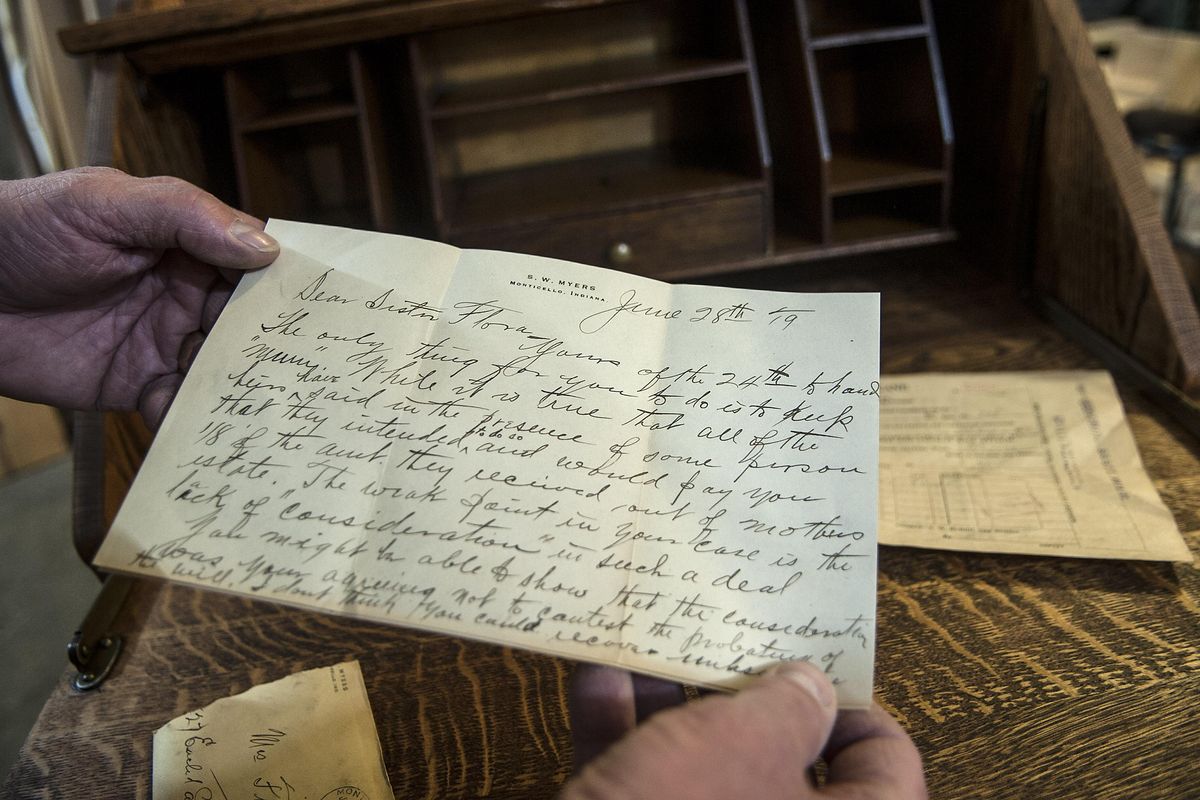Catholic Charities furniture bank gives used items new beginnings

The desk was battered and missing a drawer, but Tim Crabb saw beauty and possibilities in its oaken outlines.
Crabb runs the repair shop at Catholic Charities Spokane Furniture Bank. Since 2009, the nonprofit has provided furniture and household items to families and individuals transitioning out of homelessness into stable housing, or to low-income households experiencing an acute need.
As loads of donated items fill the bays in the building, located just behind URM Cash & Carry, Crabb performs triage, sorting what can be salvaged for those in need and what can be sold at Furnishings for Hope, the thrift store next door. Items that look hopeless and beyond repair are often restored to their former beauty and utility thanks to Crabb and his team of skilled volunteers.
“We try to use everything and throw away or recycle very little,” he said.
He set to work on the antique desk and discovered bits of paper jammed behind a letter slot. The paper turned out to be an envelope with a letter tucked inside. Both were dated June 28, 1919.
The letter was to Mrs. Flora Immel, who lived on Euclid Street in Spokane, and was from her brother S.W. Meyers in Monticello, Indiana.
Crammed in with the letter was a property tax bill from the city of Spokane dated May 1920.
While this find was unusual, Crabb said one of the perks of his job is playing detective.
“Delving into the history of donated items is part of the fun,” he said.
Clues like square nails or occluded glass help him and his team better repair donated furniture while keeping the integrity of the pieces.
He pointed to a set of bentwood chairs.
“These came in with tacky canvas seats,” said Crabb. “We rewove the cane seats. It took about 25 hours per chair.”
If they don’t know how to fix something, they learn. For example, one of his volunteers taught himself fiber rush weaving to repair another set of chairs.
“We encourage our volunteers to be creative and let their inner artist loose,” he said.
In Furnishings for Hope, a polished wooden bench with drawers displays Crabb’s own creativity and also contains a bit of Spokane history.
He ran his hand along its back.
“It’s a built-in from a house, and it had no back, just pine boards,” he explained.
The age of the bench proved problematic.
“It’s hard to find 100-year-old quarter-sawn oak,” said Crabb.
So he worked with what he had and crafted a new back out of a church pew, which came from St. Francis Xavier Church in north Spokane.
Inga Weber manages Furnishings for Hope.
“We’re not a typical thrift store,” Weber said. “What makes us different is that all items are thoroughly inspected, cleaned and repaired before being put out on the floor.”
The store, which opened in 2014, offers a variety of new, used and vintage items.
“We strive for eye appeal, like a typical furniture showroom,” said Weber.
Jim Nicks, director of the furniture bank and Furnishings for Hope retail store, said proceeds from the store go to the operating cost of the furniture bank.
“Our goal is to serve 500 families per year,” he said. “Tim pays for himself. He repairs furniture we’d otherwise throw away.”
Referring agencies like House of Charity, St. Margaret’s Shelter or the YWCA domestic violence program screen recipients who are in need of furniture and household items.
The furniture bank supplies everything needed to set up a household – beds, tables, chairs, linens, dishes, etc.
“The purpose is to provide ongoing support and stabilization, so they don’t repeat the cycle of homelessness,” Nicks said. “Studies have shown if you take someone off the streets and put them in housing with no furniture or essential household items, they go back out on the streets.”
Recently, the furniture bank was able to help a family displaced by Hurricane Harvey.
“All they had were the clothes on their back,” Nicks said.
The furniture bank and store employ a staff of 10, and they also offer the Next Step Job Training Program. The program offers opportunities for job seekers to learn things like office skills, forklift operations and warehouse work.
Volunteers from area high schools, colleges, churches and community organizations also pitch in.
Since the doors first opened, Catholic Charities Spokane Furniture Bank has provided furniture to over 3,200 households.
“We’re changing lives for very low- or no-income families,” Nicks said, smiling. “I have a great job.”
Crabb feels the same.
While the excitement of finding letters from the past in a vintage desk is fun, what truly gives him joy is thinking of those who will use the items he repairs.
He said, “When I’m working on a desk, I think about how maybe this will go to a kid, who for the first time will be able to sit at a desk and do his homework.”